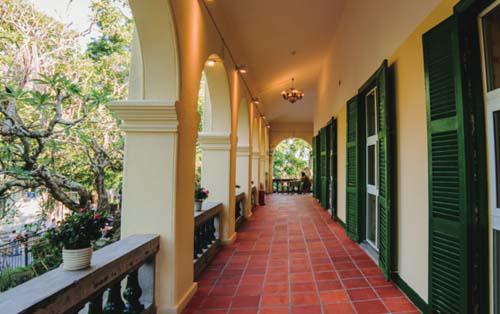RIDING THE WAVE
2018-10-31ByJacquesFourrier
By Jacques Fourrier

As the ferry slowly approaches Sanqiutian Wharf on Kulangsu Island off Xiamen in southeast Chinas Fujian Province, the excitement is palpable. From the distance, amid the patches of lush vegetation, rows of impressive, century-old European-style buildings and villas, restored to their former architectural glory, stand proudly scattered over the idyllic landscape.
Those villas and buildings on Kulangsu were built by foreigners during the mid-19th century, and later were abandoned or converted into apartments.
As the signal for reform and opening up spread all over China in 1978, economic development became the priority. The seeds of entrepreneurship were sown and Xiamen was on the frontlines, becoming one of the first four special economic zones in 1979.
After three decades of tremendous economic growth and increasing prosperity, and with the prospect of the Beijing 2008 Summer Olympics, China decided to pull out all the stops for the development of the tourism and cultural sector. Private entrepreneurship kicked in with support from authorities and was encouraged to cater to the Chinese peoples inexhaustible appetite for culture.
From strength to strength
Kulangsu became a major domestic tourist destination soon after it was listed as a National 5A Tourist Attraction in 2007. Hordes of day-trippers and tourist groups would spend several hours roaming the main alleyways before leaving the island. The hotel business was in its infancy.
“There were just 12 family inns back then, compared to 278 now,” explained Dong Qinong, Chairman of the Kulangsu Family Inns Association. The former professor at Xiamen University grew up on the island and witnessed first-hand the rapid transformation in the tourism industry over the last decade. In 2010, he embarked on a mission: converting decayed and abandoned architectural wonders from the past into quaint, modern family inns. This indefatigable academic-cum-entrepreneur also played a large role in promoting and defending Kulangsus bid with UNESCO. His efforts paid off when the island became a World Cultural Heritage Site on July 8, 2017.
Initially, this ambitious mission seemed at odds with UNESCOs selection criteria in terms of sustainability and preservation.“Some even worried that the development of family inns would be detrimental to our UNESCO bid,” said Dong.
To that effect, the Xiamen Government published a set of rules and regulations regarding the establishment of family inns on Kulangsu for the first time in 2008, while requirements were constantly upgraded and reinforced to protect and preserve the islands venerable buildings as well as its natural environment.

Zhang Xiaojuan is one of many outsiders who fell in love with Kulangsu. This former international business company executive brought back to life a villa listed as a protected building built in 1919. After a couple of years of painstaking and costly renovations, she finally opened Chaoting 1919, a 24-room inn, in August 2012. “This venture is always, to a certain extent, a work in progress,” she remarked, scratching the crumbling century-old stuccoed figures on the outside wall. “Whatever alterations we undertake, big or small, we need to get approval and its not an easy process.”
Hundreds of entrepreneurs and individuals such as Zhang spent time, effort and money to renovate Kulangsus most valued architectural treasures. According to Dong, by 2017, an estimated 600 million yuan($86.66 million) had been invested over the past decade. “It had a major impact on our UNESCO bid,” he said.
A life-changing decision
Huang Hengming and his wife Chen Liya made a life-changing decision in 2007, almost on the spur of the moment, when they took on the challenge of transforming an abandoned residence with a unique view of Xiamens coastline into an exquisite family inn called Xilinge.
Chen hails from Kulangsu and her family has been living on the island for over a century. Her mother was a groundbreaker in private entrepreneurship on the island as early as the 1980s. Moreover, raised in the Christian faith, Chen has always had strong connections with Kulangsus religious community. “The church had many vacant or abandoned properties on the island and our priest, the Reverend Hao, suggested we take a look at Guniang Lou. It was love at first sight,” she recalled.
Guniang Lou, or Residence of the Young Ladies, was built in 1842 to accommodate women Presbyterian missionaries and ministers from the UK. “Last year, before the successful UNESCO bid, a government delegation was sent to the UK and brought back old photographs from this period. They bear witness to Kulangsus unique heritage and are now permanently exhibited in our inn,” said Chen proudly. The building is one of the 53 representative historical buildings, gardens, structures and cultural sites included in the UNESCO Heritage list,” Chen said, adding that its the only one that was converted into an inn.
Huang did his best to transform and decorate in a tasteful and subtle manner this eight-room grand mansion, but he also added new structures to accommodate a restaurant. An engineer by trade, he found his true vocation in Kulangsu, where he was able to put to the test his extraordinary skills. All fingers and thumbs, Huang is a man of action as capable of whipping up an impressive improvised candlelit dinner in his tiny kitchen as he is of building a pocket-sized outdoor chapel in the garden. His wife regularly organizes cultural events, from musical evenings to poetry readings and book signings.
“In these family inns, every building tells a story,” said Dong. “Guests will be able to experience to the fullest their cultural significance.” And with some luck, share a few tips and wander off the beaten track.
Despite great concerns over environmental issues and a potential loss of authenticity, Kulangsu has not sold its soul to mass tourism and property developers. On the contrary, the islanders and authorities have been able to overcome numerous challenges and work together to protect this invaluable gem. “With the opening-up policies, Xiamen underwent a metamorphosis by liberating the entrepreneurial spirit of the population,” remarked Dong.“Family inns on Kulangsu provide a positive energy to the island.”
With more than 4,000 rooms, this positive energy will undoubtedly spread as an increasing number of visitors are now able to spend a few nights on the island and have a taste of the slow-paced lifestyle of the former international settlement.
